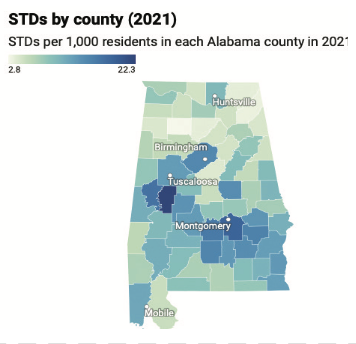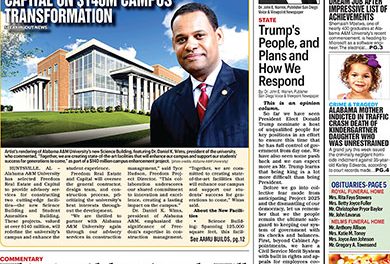By Ramsey Archibald
Alabama – and the rest of the nation – saw a significant decline in reported sexually transmitted diseases in 2020. But that doesn’t mean cases actually decreased – and if 2021 numbers are any guide, the opposite is likely true.
According to data from the Alabama Department of Public Health, STDs in Alabama rose dramatically between 2020 and 2021. But cases aren’t spread evenly across the state.
STDs by county
STD rates vary widely by county, with some areas seeing rates above 22 cases per 1,000 residents and others seeing less than three per 1,000. You can see the rate in every Alabama county in the map below.
The Black Belt region – one of the poorest regions in the nation – saw some of the highest STD rates in the state in 2021. Each of the six Alabama counties with the highest STD rates were in the Black Belt, including the highly populated Montgomery County, home of the state capital, which saw a rate of 18.7 cases per 1,000 people, the second highest in Alabama.
Jefferson County, home of Birmingham and the most populous county in Alabama, saw nearly 15 cases per 1,000, the seventh highest rate in the state. Mobile County, the second largest county in Alabama, ranked just inside the top 20 for STD rate, with 11.8 per 1,000 residents. Madison County, home of Huntsville – Alabama’s largest city – ranked 25th out of 67 counties with an STD rate of 10.3 per 1,000.
Each of those large counties saw a higher rate than the state as a whole, which came in at 9.9 cases per 1,000.
The COVID dip
STD cases statewide were up in 2021, especially cases of chlamydia, by far the most common type of STD in the state. But gonorrhea and syphilis cases also rose.
ADPH reports there were more than 31,400 chlamydia in Alabama in 2021, up from 27,000 in 2020. That’s a difference of more than 4,000 cases, or a 16% increase. The 2021 number is a slight increase from pre-pandemic levels, and STD cases overall have gone up steadily since the middle of the last decade.
But the year-to-year difference from 2020 to 2021 likely isn’t because of a large change in actual cases, but rather a large change in testing, according to Dr. Jodie Dionne, an associate professor of medicine in the division of infectious diseases at the University of Alabama at Birmingham.
“Starting in March 2020, there was about a 25% drop in STI testing,” she said. “It’s because clinics were closed.”
COVID-19 brought almost every aspect of life to a standstill, including STD testing. The Centers for Disease Control and Prevention also warn against taking 2020 numbers too literally because of a nationwide decrease in screening and other complications due to the pandemic.
But just because clinics were closed and testing was down doesn’t mean STDs weren’t spreading. And in many cases, testing is key because many STDs won’t be caught without a test.
“Most STIs, especially in women, are asymptomatic,” Dionne said. “If we’re not doing this testing, we’re missing new infections because most people feel just fine.”
And if testing is down 25%, then experts worry about missing 25% of cases, she said.
But there is at least one good thing that came out of the pandemic – the advent of at-home testing. COVID-19 home test kits are now widely available throughout the United States, and that change in mindset could be spreading to other forms of health diagnostics, Dionne said. That includes a future where people can test themselves for STDs in the comfort of their own homes.
Dionne mentioned a statewide pilot program from ADPH that currently has limited funding, but is experimenting with this home testing.
“These are not complicated tests to do – just like a COVID test,” she said. “Often people prefer to do them themselves.”











